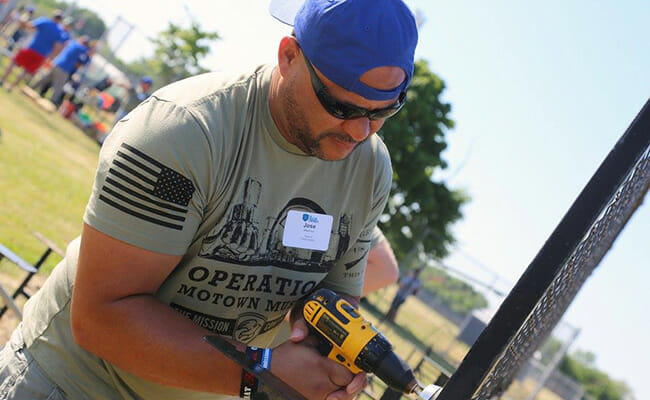Veterans’ Civic Engagement Strengthens Communities Nationwide
You are likely familiar with the ways that Americans can give back to help veterans, but did you know that veterans are among the most active volunteers working to improve communities across the country? Data from the 2016 Veterans Civic Health Index report, created by Got Your Six, revealed that veterans are more likely than non-veterans to volunteer with their neighbors to fix problems in their communities.
Last year veterans volunteered an average of 169 hours of their time compared to an average of 126 hours spent volunteering by non-veterans. More than 10 percent of veterans worked with their neighbors to fix problems in their community compared to just under 8 percent of non-veterans.
“The military teaches us the value of purpose and the importance of principles,” said Bill Rausch, executive director of Got Your Six, during a panel discussion on the findings of the report.
Janaia Deshields, vice president of veterans and military programs at Points of Light, joined Rausch and Sec. Bob McDonald, Department of Veterans Affairs, on the panel hosted by SiriusXM Politics.
“There are tons of issues in our communities right now and our country where we should be uniting to come up with solutions. … Our veterans are going to be leaders in those communities,” said Deshields, who is also a U.S. Army veteran.
Volunteering is a two-way street, and while there are many ways the veterans benefit from the work of volunteers, communities nationwide benefit greatly from the dedicated, ongoing service of veterans and military families.
Daily Point of Light Award honoree Jose Martinez found his calling with The Mission Continues, an organization that evokes veterans’ inner call to service and engages them in projects that will improve their communities. Through a platoon-like structure, meant to resemble the internal structure of the military, The Mission Continues helps veterans reconnect with both their communities and themselves.

“When you leave the military, you’re starting all over. And you lose that – whatever it was in the military that you were – sergeant first class, a private, even your name because in the military we go by last name or nickname. You’re no longer that person anymore,” Jose explained.
This sentiment is echoed by many other veterans who find that volunteer service gives them renewed purpose as they transition back to civilian life. “All of us have this sense of wanting to be part of something bigger than ourselves,” said Sec. McDonald, during the Got Your 6 panel discussion.
In addition to connecting with their community, veterans are able to connect with other veterans through volunteer service.
For example, Daily Point of Light Award honoree Krystol Stinson, a veteran of the U.S. Navy, works with returning vets who struggle with mental health and finding employment. Her work with 22 Too Many helps raise awareness about veteran suicide, which ranks at about 22 a day according to a Department of Veterans Affairs report.
World War II veteran Irwin Strovroff started Vets Helping Heroes, which unites veterans facing physical and mental disabilities with service dogs. Since he started this program in 2007, Stovroff has helped more than 250 veterans recover from physical and psychological challenges.
15-year Marine veteran and Daily Point of Light Sean Gobin founded Warrior Hike, a nonprofit therapy program that takes veterans on scenic nature hikes to aid their transition and help fight PTSD. Gobin has hiked with more than 71 veterans.
To engage veterans interested in volunteer service, some nonprofits and other volunteer organizations are leveraging the hard work ethics and tactical organization skills gained through their military service. Veterans can become service leaders in their communities through programs like Points of Light’s Frontline Families, or through organizations like The Mission Continues and Team Rubicon that equip veterans with the necessary tools to serve to their communities.
To find more opportunities to serve or serve alongside veterans in your community, visit www.allforgood.com.
